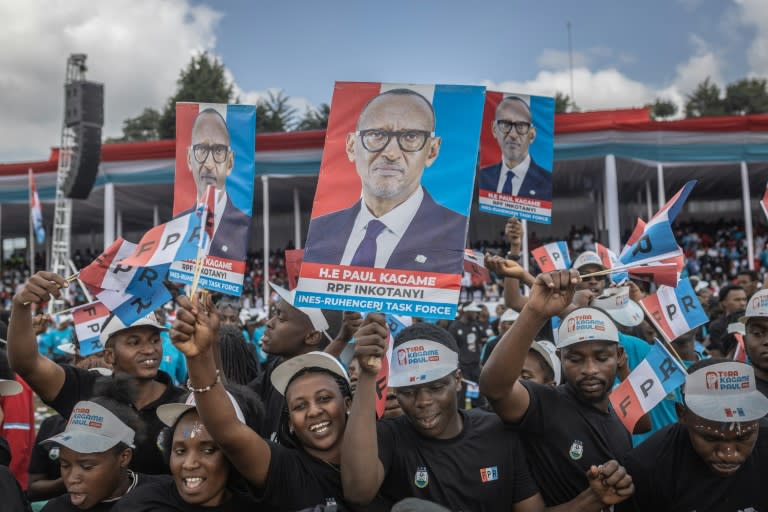Rwanda heads to the polls as Kagame makes fourth-term bid

Rwandans will vote in elections on Monday, with President Paul Kagame widely expected to extend his iron-fisted rule and sweep to victory in a race featuring the same candidates he defeated seven years ago.
Rwanda's de facto ruler since the end of the 1994 genocide, Kagame faces rival bids by Frank Habineza, leader of the Democratic Green Party -- the only authorised opposition -- and Philippe Mpayimana, who is running as an independent.
The 66-year-old Kagame is credited with Rwanda's economic recovery after the genocide, with annual GDP growth averaging 7.2 percent between 2012-2022.
But his regime is widely criticised for stifling political opposition at home, while a UN report has accused Rwandan troops of fighting alongside the M23 rebel militia in the neighbouring Democratic Republic of Congo.
Kagame has won three elections with more than 93 percent of the vote in 2003, 2010 and 2017, taking home nearly 99 percent in the most recent poll.
Habineza secured just 0.48 percent of the vote in 2017, with Mpayimana edging past him with 0.73 percent.
Rwandan courts rejected appeals from prominent opposition figures Bernard Ntaganda and Victoire Ingabire to remove previous convictions that effectively barred them from standing.
The election commission also barred high-profile Kagame critic Diane Rwigara, citing issues with her paperwork -- the second time she was excluded from running.
The daughter of industrialist Assinapol Rwigara, a former major donor to Kagame's Rwandan Patriotic Front (RPF) before he fell out with its leaders, she was accused of forging documents and arrested in 2017 before being acquitted by the courts a year later.
A total of 9.01 million Rwandans are registered to vote, with the presidential poll being held at the same time as legislative elections for the first time.
- 'President forever' -
The imbalance between Kagame and his rivals has been evident during the three-week campaigning period, as the well-oiled RPF PR machine swung into high gear.
Pennants on cars, flags, posters and banners displayed along roadsides, the red, white and blue colours of the ruling party and its slogans "Tora Kagame Paul" ("Vote Paul Kagame") and "PK24" (for "Paul Kagame 2024") are everywhere.
In contrast to the thousands-strong crowds attending his rallies, his rivals have struggled to make their voices heard, with barely 100 people showing up to some events.
"I came here to listen what he says but I will vote for Kagame... regardless of the others," Beatrice Mpawenimana, 30, told AFP at a meeting organised by Habineza's party in the eastern village of Juru.
"He has given us women a voice, he has brought roads, hospitals, so many things... I want him to be president forever, nobody can replace him."
Like most Rwandans -- 65 percent of the country's population is aged under 30 -- she has only ever known Kagame as leader.
The bespectacled politician has been in charge of the landlocked nation since his RPF militia routed Hutu extremists responsible for the genocide which left 800,000 dead, mainly Tutsis but also moderate Hutus.
- 'No real opponent' -
Initially serving as vice-president and defence minister, Kagame was elected president by parliament in 2000 after the resignation of Pasteur Bizimungu.
Since then, he has won elections by universal suffrage three times: 95.05 percent in 2003, 93.08 percent in 2010, and 98.79 percent in 2017.
"The RPF ruling party is quite popular across the country, this is undeniable," Rwandan constitutional lawyer and political analyst Louis Gitinywa told AFP.
"As for the election, it is like an exercise that must be done simply to tick a box. There is no real opponent against Kagame."
Rights groups accuse the government of abuses including repressing freedom of expression and stamping out dissent.
Amnesty International said this week that Rwanda's political opposition faces "severe restrictions... as well as threats, arbitrary detention, prosecution, trumped-up charges, killings and enforced disappearances."
Kagame presided over controversial constitution amendments in 2015 which shortened presidential terms from seven to five years and reset the clock for the Rwandan leader, potentially allowing him to rule until 2034.
str-sva/amu/txw/cw


